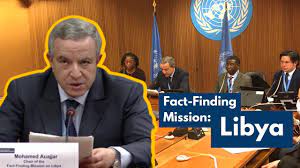
Human Rights Council discusses the final report of fact-finding mission to Libya
Next Monday, April 4, 2023, the Human Rights Council will discuss the report of the Mission’s fact-finding mission.
on March 27, 2023, the mission hold a conference and issued a statement, and a report and accompanied it with a detailed report. The Mission said in its conference that the human rights situation in Libya is deteriorating continuously and concluded in its report that there are reasonable grounds to believe that the State, security forces and armed militias have committed a wide range of crimes against humanity and war crimes.
Chairman of the mission Mohamed Auger “Accountability is urgently needed to end this rampant impunity. We call on the Libyan authorities to develop a human rights action plan and a comprehensive, victim-centred roadmap to achieve transitional justice without delay, and to hold accountable all those responsible for human rights violations.
In its report, the Mission said “The mandate of the mission ends as the human rights situation in Libya deteriorates, parallel state authorities are established, and the legislative, executive and security reforms needed to strengthen the rule of law and unify the country are far from being achieved. In this polarizing context, armed groups implicated in allegations of torture, arbitrary detention, trafficking and sexual violence remain unaccountable.”
On migrants and asylum seekers, the report said, ” The Directorate for Combating Illegal Migration is the official entity of the Libyan Ministry of the Interior responsible for migrant detention centres across Libya. The Council of Ministers of the Government of National Unity appointed Mohamed al-Khoja, the head of the al-Khoja militia and Tariq al-Sikka detention centre, as head of the Directorate for Combatting Illegal Migration in January 2022. The Stability Support Apparatus was established in January 2021 by the Presidential Council. It is made up of an alliance of armed groups and is led by militia leader Abdel Ghani al-Kikli, also known as “Ghneiwa”.
On the role played by the European Union and the strategy of pushbacks of migrants and asylum seekers to Libya, the report said “Libyan authorities, including the Directorate for Combating Illegal Migration, the Libyan Coast Guard and the Stability Support Apparatus, and third States have been on notice for years regarding the ongoing widespread and systematic attacks on migrants, including violations occurring at sea, in detention centres, along trafficking and smuggling routes and in trafficking hubs.[1] Nonetheless, in accordance with memorandums of understanding between Libya and third States, the Libyan authorities have continued their policy of intercepting and returning migrants to Libya, where their mistreatment resumes. Based on the substantial evidence and reports before it, the Mission has grounds to believe that the European Union and its member States, directly or indirectly, provided monetary and technical support and equipment, such as boats, to the Libyan Coast Guard and the Directorate for Combating Illegal Migration that was used in the context of interception and detention of migrants”
The mission also documented the involvement of Libyan figures in cases of smuggling and human trafficking, as the report said. ” The Mission also collected evidence of collusion between the Libyan Coast Guard and those in charge of al-Nasr detention centre in Zawiyah. Abd al-Rahman al-Milad, also known as “Bija”, the head of the regional unit of the Libyan Coast Guard in Zawiyah, is on the Security Council sanctions list for involvement in trafficking and smuggling.[2]“
On arbitrary detention and detention, the mission found that state authorities and affiliated entities, including the Deterrence Service for Combating Terrorism and Organized Crime, the Libyan Arab Armed Forces, the Internal Security Service and the Stabilization Support Agency, as well as their leaders, have repeatedly been involved in violations and abuses. It said in its report ” The Mitiga airport complex, including places of detention located therein, remains under Radaa’s control. Radaa is an armed group that was formally integrated into the Deterrence Apparatus for Combating Organized Crime and Terrorism by the decision of the Presidential Council of the Government of National Accord in 2018.[3] The Deterrence Apparatus for Combating Organized Crime and Terrorism was reorganized by the decision of the Government of National Accord in 2020.[4]“
In Monday’s session, the final report will be presented. The head of the mission, Mr Aujar, will present his report to the Human Rights Council, and then the Libyan state will be allowed to respond to the report. The member states of the Council will engage in an interactive dialogue. According to the conventions of the council, non-governmental organizations will be allowed to comment and express their opinion. Human Rights Solidarity has already prepared its intervention where HRS will request the establishment of an independent international investigative mechanism, due to the continuous deterioration of the human rights situation and the inability and failure of the Libyan authorities to End impunity
[1] See A/HRC/48/83, A/HRC/49/4 and A/HRC/50/63.
[2] See United Nations, Security Council consolidated list and Security Council resolution 1970 (2011).
[3] Government of National Accord, Presidential Council decision No. 555 (2018).
[4] Government of National Accord, Presidential Council decision No. 578 (2020).


